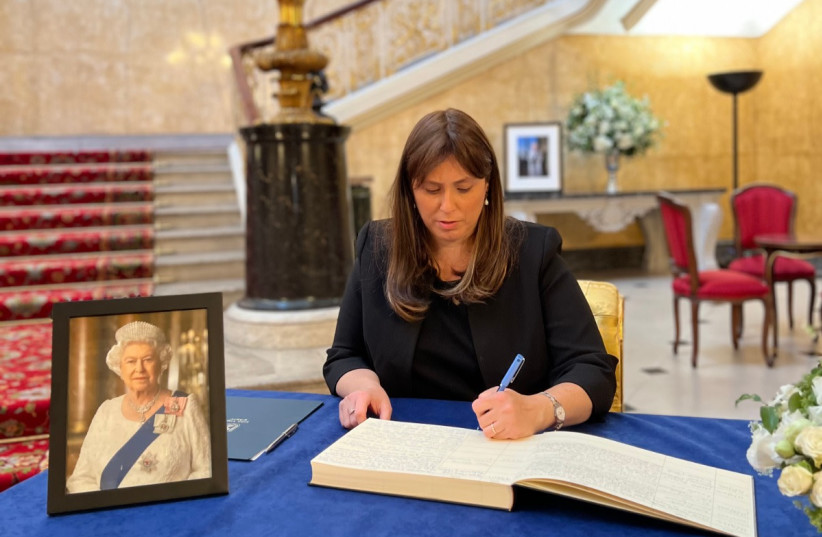Queen Elizabeth II was a great diplomat and a friend of the Jewish people, Ambassador to the United Kingdom Tzipi Hotovely told The Jerusalem Post, as she eulogized the beloved monarch who will be laid to rest on Monday.
“For 70 years she was the [country’s] top diplomat,” and “I don’t think” that anyone can get close to that kind of a record,” said Hotovely.
The Queen’s official title is “defender of the faith” and she was “a great friend of the Jewish community” particularly given that she herself had lived through World War II and had served in the women’s branch of the British Army toward the end of the war.
“She was very sensitive and respectful to Holocaust survivors, and always listened to them beyond [the] protocol time [allotted] and shared moments with them,” Hotovely said.
She added that she herself was honored to be the last Israeli Ambassador to present her credentials to the Queen in 2020.

It was a formal affair that began with a carriage that meet her and her husband at their door and delivered them to Buckingham Palace.
The audience also included Prince Philip, the Duke of Edinburgh who passed away last year.
“I was privileged to have a 20-minute conversation with her at Buckingham Palace when I presented my credentials, and it was an unforgettable moment,” Hotovely recalled.
The Queen was very sharp and “interested in regional politics,” Hotovely recalled.
“She was very specific about our circumstances and even made a comment about Israel having many elections.”
Israeli Ambassador to the UK Tzipi Hotovely
“It’s [well] known that the Queen had a wit and she made so many comments that made me smile,” she added.
Toward the end of the meeting, Hotovely’s husband asked Queen Elizabeth for advice. She responded, “invest in those who are dear to you.”
The Queen “was a very wise woman and everyone that met her had a very special feeling like they had met a historical figure,” Hotovely said.
Queen Elizabeth II's relationship with Israel
Queen Elizabeth II has a mixed reputation in Israel, which is located on territory governed by Great Britain from 1920 to 1948. The Queen visited over 100 countries while on the throne but never came to Israel, even though she traveled many times to the Middle East, including to neighboring Jordan.
Queen Elizabeth has often been blamed for the long-standing royal snub, but Hotovely said she didn’t believe that her failure to visit was a reflection of her feelings for the Jewish State.
“Many people have the impression that royals travel to places they just want to, without having a Foreign Office agenda behind it.
“It is very clear that for many years the Foreign Office, which created those foreign trips, made a decision that” the Queen would not visit Israel, Hotovely said.
She pointed to a speech that Lord Stuart Pollack made after the monarch’s death, in which he supported this thesis, Lord Pollack recalled for the Lords a conversation with the Queen’s daughter Princess Anne in which they agreed that it sad that the monarch had not been given a chance to visit Jerusalem.
Today, Israel’s relationship with the Foreign Office “is on a totally different page,” Hotovely said. She pointed to Prince William’s visit to Israel in 2018 and the two trips made by King Charles III, in 2016 and in 2020, when he was still ranked as a Prince.
There is also a close friendship between President Isaac Herzog and the king, Hotovely said. Herzog who is London for the funeral with his wife, Michal, paid their respects to Queen Elizabeth II by visiting her coffin as it lay state in Westminster Hall.
September has been one of great change in British leadership, Hotovely said, not just because the king replaced his mother Queen Elizabeth on the throne but also because Liz Truss had taken over for Boris Johnson as prime minister.
The shift in leadership comes at a time of close ties between the United Kingdom and Israel, Hotovely said.
“We really have a golden era of Israel-UK relations,” she said.
This is the first time that “a British prime minister is talking about the idea of moving the British Embassy to Jerusalem, which is amazing and a real breakthrough in” the British Foreign Office’s relationship to Israel. For many years “it was quite clear” that one could not discuss the status of Jerusalem, Hotovely stated.
The two governments are also aligned on the urgency of preventing Iran from obtaining a nuclear weapon, Hotovely said.
Truss supports Israel at the United Nations and on its right to self-defense, Hotovely said.
But at this moment, the focus is on bidding farewell to the era of Queen Elizabeth, who in her later decades was a grandmother figure for the nation and one to which they felt very close.
When she went to the palace to lay flowers at the gate with her daughters, Hotovely said, she noted that many of the notes that had been left there were from children.
“She was like the grandmother of the nation... beyond the big national symbol, the British family felt that she was part of her family,” Hotovely recalled. “She is a real presence in the nation’s life.”
